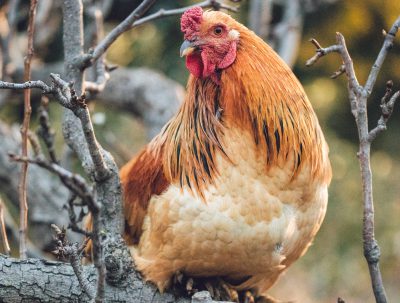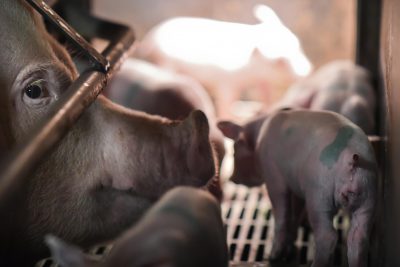Chickens are intelligent, sentient, social, playful beings. There is no doubt about that at all. Despite that, some people find it as difficult to relate to birds because they appear to differ from us in so many ways. But in fact, we share a lot in common.
How Smart Are Chickens?
Chickens are really smart and have sophisticated sensory abilities. Chickens have a complex nervous system, and are sensitive to pain, pressure, and temperature, just like humans and mammals. Chickens also have highly developed visual capabilities and can see a broader range of colors than humans. Some breeds of chickens can even sense magnetic fields.
Chickens can count. One study from the University of Padova demonstrates how chicks can recognize difference in values. Researchers placed three objects behind a screen and only two behind another. The chicks would consistently go towards the screen with more objects behind it.
Chickens use language too. Chickens have at least 24 types of vocalizations that they use for different scenarios. For instance, they have different vocalizations for a predator coming by water than by land, or to communicate things like, “let’s stay together.”
How Do Chickens Behave and Feel?
Just like dogs or humans, chickens have unique personalities and feel different emotions. They express themselves in varied and complex ways, demonstrating strong emotional and mental capacities.
For instance, did you know that chickens can dream? A study that analyzed the electrical activity of brains shows that birds like chickens experience wave-like sleep where they go through various phases. That means they transition through different mind states like slow wave sleep, intermediate sleep, and rapid eye movement sleep. This is just like humans!
Chickens can recognize others and they treat others differently. On cramped factory farms, this often takes the form of a “pecking order” where the birds interact in a hierarchy with some chickens more dominant or shy than others. They know who to avoid, and who to befriend.
Chickens are also empathetic. For instance, hens empathize with their chicks when they’re uncomfortable. In one study, when researchers put stress on the chicks, it lead to a physical reaction in hens—their body temperature and heart rate rose. A flight-or-fight mentality is activated when they’re under distress showing that they really feel for their chicks. Their great parents, as the idiom “mother hen” implies.
Chickens Suffer on Factory Farms
Most farmed animals are chickens and almost all of them are kept on factory farms. Chickens are much smaller than other domesticated animals like cows and pigs, so many more of them are bred, reared and killed in order to get a similar quantity of meat. Plus, as the environmental impact and cancer risks of red meat are becoming widely known, people switch to eating chicken.
Factory farm units are large, dark, and long buildings; often cramped full with tens of thousands of birds. There, they don’t have access to carry out their natural behaviors like perching, roaming, roosting or nesting but usually, have less than a paper sized area to themselves. The environments are not cleaned for the entirety of a birds’ life, leading to excessive ammonia levels from their waste. It gets so bad that ammonia often fills their lungs and the birds may die of “sudden-death syndrome”.
Chickens raised for food have incredibly short lives too, just 47 days on average in the U.S and 42 in the EU. Their natural lifespan can be over seven years. One chicken, named Matilda even lived to be 16 years old!
Chickens Are Similar to Our Companion Animals
One important fact to consider is how much of what we know about chickens is based on agricultural research, as this scientific review points out. The industry commodifies chickens and thinks about them in terms of productivity, which makes the research a bit murky. Chickens aren’t often observed as birds, in more natural or relaxed environments. Despite this, those who have interacted with chickens in less cruel environments (such as in sanctuaries)) can confidently claim that chickens are smart, charismatic, and emotionally capable.
Just like when dogs or cats are rescued from less-than-ideal situations, they lower their defenses. They often start to show their true selves. In more relaxed settings, where chickens can exhibit natural behaviors like those on farm sanctuaries, they like to play games such as hide and seek, build cosy nests, and may even start purring like a cat when you stroke them.
Chickens in happy homes are happy birds.
How To Help Chickens
The best way to help chickens is to leave them, and all other animals, off your plate and to stop supporting the factory farming industry. A great place to start is our in-depth Vegan Starter Kit. Download it today and discover a kinder, healthier, happier, safer and more sustainable way to eat.
Photo by Jason Leung on Unsplash



